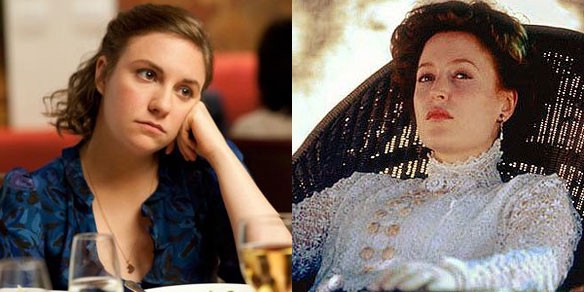Pop Quiz: Edith Wharton? Or "Girls" Review?
Pop Quiz: Edith Wharton? Or “Girls” Review?
by Ali Pechman

1. “New York’s not very friendly to strange girls, is it? I suppose you’ve got so many of your own already — and they’re all so fascinating you don’t care!”
2. “The chief characteristic of her generation is a kind of creative solipsism: nothing is better material than the absurdities and contradictions of her own life. Successfully mining personal experience of underachievement has, of course, its ironies.”
3. “As a girl, you are a delicate glass vase, waiting to be broken. You are a sweet-smelling flower, waiting for life’s hobnailed boots to trample you. That built-in suspense is part of your appeal.”
4. “It is less mortifying to believe one’s self unpopular than insignificant, and vanity prefers to assume that indifference is a latent form of unfriendliness.”
5. “Writing about the lives of women is a minefield. There are demands for ‘realistic’ representation, yet what constitutes realistic is ephemeral, shifting from woman to woman. What is relatable for one woman is completely alien for another.”
6. “If she was faintly aware of fresh difficulties ahead, she was sure of her ability to meet them: it was characteristic of her to feel that the only problems she could not solve were those with which she was familiar.”
7. “Entitlement can be a superpower: It’s the strength to believe, even when no one is listening, that you do have something to say.”
8. “Her story turns on the paradox of wanting access to power afforded by a city that’s the cultural capital of the moment while simultaneously desiring connection with a critical mass of people in situations similar to her own.”
9. “There were certain things that had to be done, and if done at all, done handsomely and thoroughly; and one of these in the old New York code, was the tribal rally around a kinswoman about to be eliminated from the tribe.”
10. “She found poignant pleasure, at this stage in her career, in the question: ‘What does a young girl know of life?’”
11. “Every morning the papers hit the door. Every morning yards of agitation and anxiety and self-alienation, briefs on how to get and spend our identities … queries about manners and mores and the mediated self, and so forth&mdasha;these meet the door downstairs with a solid thud.”
12. “The more art purports to represent our reality, the more we end up scrutinizing it, pinning all our hopes on it, and feeling contemptuous when there are cracks in the mirror it holds in front of our faces.”
13. “She was so evidently the victim of the civilization which had produced her, that the links of her bracelet seemed like manacles chaining her to her fate.”
14. “There’s nothing grimmer than the tragedy that wears a comic mask.”
15. “Might it actually be braver, or more revolutionary, to portray sex as sometimes without dire consequence, or not totally absurd? To mingle the comic with a deeper investment, the bad parts with the fun parts?”
16. “The piece wants to flow like a length of ribbon unspooled in asides, advancing at digressive stretches, looping old news in ellipses to retrace patterns of thoughts, and so on, and on, until the whole of the thing gathers like a bloom of a bow pinned at the point of an eye.”
17. “She is still a bundle of engaging possibilities rather than a finished picture.”
Answers
Edith Wharton:
1. The Custom of the Country; 4. The House of Mirth; 6. The House of Mirth; 9. The Age of Innocence; 10. The Custom of the Country; 13. The House of Mirth; 14. The House of Mirth; 17. The Buccaneers
“Girls” Review
2. Hermione Hoby, The Guardian; 3. Heather Havrilesky, New York Times Magazine; 5. Jen Evans, BitchBuzz; 7. Emily Nussbaum, New York; 8. Richard Brody, The New Yorker; 11. Troy Patterson, Slate; 12. Nona Willis Aronowitz, GOOD; 15. Katie Roiphe, Slate; 16. Troy Patterson, Slate.
Related: “The House Of Mirth” As A Poorly Played Game of “Choose Your Own Adventure”
Ali Pechman lives in Chicago.
